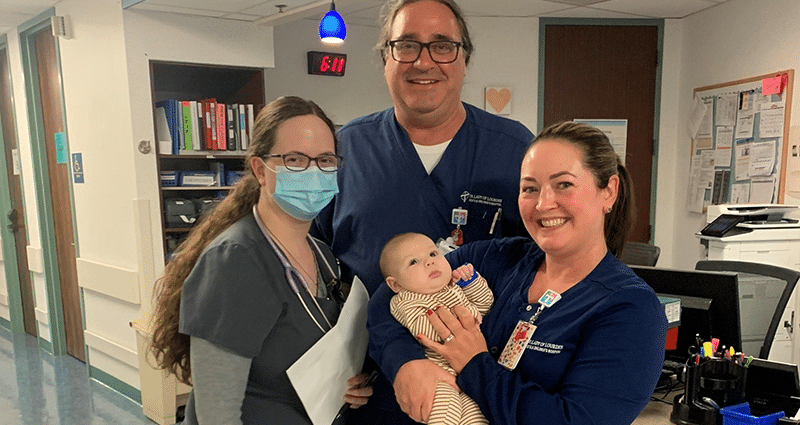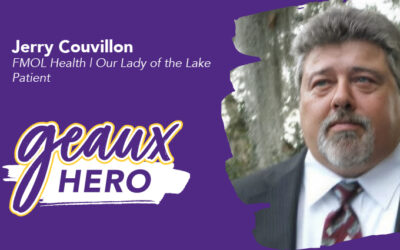Last June, Kelsey LeBlanc noticed something seemed amiss with her seven-week-old son, Nash. He had a slight fever and kept coughing.
At a local emergency room, Nash was diagnosed with RSV and released shortly thereafter. But, Nash’s condition worsened over the next several hours. A second ER visit revealed the newborn had both RSV and rhinovirus.
Doctors admitted Nash into the pediatric intensive care unit (PICU) at Our Lady of Lourdes Women’s & Children’s Hospital, the only unit of its kind in Acadiana. What followed was a 28-day hospital stay, including a two-week intubation.
“I don’t know that we would have made it through some of those days without the nurses and support team in the PICU,” LeBlanc said. “In the scariest moments of my life, they were able to keep me calm and pick me up at the most fragile moments. Every nurse knew Nash whether they were treating him or not. They all spent time talking to us and answering questions. They were always so thorough and reassuring along the way. I can’t say enough about the care they took of my son.”
LeBlanc said Nash’s doctors and nurses cautioned that after an infant is intubated, the medical journey is a roller coaster rather than a linear path. That proved to be true as Nash would make progress and then regress. One of the most difficult nights was when Nash’s temperature dropped significantly. His medical care team suggested a different treatment option that ultimately helped Nash begin the road to recovery.
“That was really a turning point because after that, the ratio of oxygen and carbon dioxide in his blood improved and he was able to start breathing on his own and come off life support,” LeBlanc said. “There were tons of ups and downs, but he rounded a corner.”
The high quality of care that Nash received is thanks to Lourdes’ commitment to having a trained and dedicated staff of medical professionals who are equipped to handle the most severe pediatric health needs. Dr. Reynaldo dela Rosa, medical director of the PICU, said the team treats patients with a wide gamut of conditions, including respiratory problems, neurological issues, traumatic injuries, cancer and more.
“It’s a multidisciplinary approach that includes doctors, nurses and patients,” Dr. dela Rosa said. “We do rounds every day where we discuss the present condition, what happened overnight and the plan for the day. We always get input from the family because we want them to feel like they are part of the team and have a role in making decisions.”
Dr. dela Rosa said Nash represented a rare case of RSV that escalated into the need for intubation. The virus is most prevalent from the late fall to early spring and can affect children or adults. Symptoms can include wheezing, trouble breathing, fatigue and fever. Most people with RSV recover without the need for hospitalization after a regimen of medication. However, having a PICU in Lafayette means that pediatric patients like Nash who need advanced care can stay close to home.
“We live just a few minutes away from the hospital and it felt like a blessing that we had this PICU and staff nearby,” LeBlanc said. “Nash was never alone because someone in our family was always able to be there. Not only do we have this amazing location, but it’s an advanced level of care. It literally keeps kids alive by being so close to so many families. It’s truly special to have a place like that here in Lafayette.”
Dr. dela Rosa said the PICU serves patients throughout Acadiana as well as surrounding communities that may not have easy access to a similar facility. This means children can receive both the necessary medical treatment and family support. In addition, patients with chronic conditions are more likely to maintain appointments and follow a long-term care plan when they are closer to their physicians and specialists.
“We have most of the sub-specialties that a PICU needs,” he said. “We’re all on the same campus, so they can walk to a clinic and see patients if the need arises. If a patient needs follow-up care after being discharged, they come to the same campus here in Lafayette rather than driving two or three hours to another hospital. That’s very convenient and definitely helps people keep up with their care.”
LeBlanc said that a year after his health crisis, Nash has made a total recovery. He recently celebrated his first birthday and has begun walking and trying to say words. His favorite activities include following his older sister around the house, playing on the trampoline, being outside and eating. He has also caught up on milestones for his age and has gained weight since his hospitalization, now coming in at a robust 24 pounds.
“He’s the happiest, sweetest, most resilient little guy I have ever known,” she said. “He’s healthy and chatty and all over the place, just like any other 14-month old. I just don’t know that we would have had the same miracle outcome if not for the care we received at the PICU. They truly kept my son alive.”




